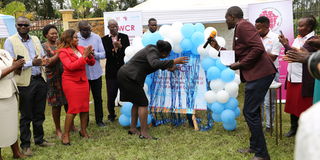New campaign bets on youth to end FGM in Migori

Migori Governor Ochilo Ayacko's wife, Agnes (in black), and Gender executive Rahab Robi (in red) during the launch the Catalysing Whole Community Response (CWCR) for Abandonment of FGM Project.
What you need to know:
- The new initiative is dubbed Catalysing Whole Community Response for Abandonment of FGM Project.
- This is one of the strategies the county is suing to end gender-based violence, among other harmful practices.
The Migori government has launched another initiative aimed at fast-tracking the elimination of female genital mutilation (FGM) in the Kuria region.
The county, through the Catalysing Whole Community Response (CWCR) for Abandonment of FGM Project, has partnered with the Network for Adolescent and Youth of Africa (NAYA), Tunaweza Empowerment Organisation (TEO) and the United Nations Children’s Fund (Unicef) to ensure it is free of the harmful practice and other forms of gender-based violence.
Despite universal recognition that FGM has no medical value and violates fundamental human rights, 15 per cent of girls and women aged 15–49 in Kenya have undergone the knife, according to the Kenya Demographic and Health Survey (KDHS, 2022). Additionally, 574,121 girls and women risk undergoing FGM by 2030.
The Kuria community, which is predominantly in Migori County, features prominently in FGM practice at 78 per cent, according to a Unicef report. Twenty-eight per cent of circumcised women aged 20–24 underwent the practice between the age of five and nine, and more than seven out of 10 were cut by age 15, leading to severe immediate and long-term health and socioeconomic effects.
According to Dr Grace Kanyi, a consultant obstetrician and gynaecologist, the immediate complications of FGM include severe pain, bleeding, and urine retention.
“The gynaecologic complications include menstrual retention, cysts, infections; obstetric complications such as difficulty in the birthing process, obstructed and prolonged labour and tears; sexual consequences such as sexual intercourse, lack of orgasm, satisfaction, and lubrication; and psychological impacts such as anxiety, depression, post-traumatic stress disorder, and low self-esteem,” she notes.
Making her remarks during the launch of the initiative, Agnes Ochilo, the wife of Migori Governor Ochilo Ayacko, said the project recognises that FGM is rooted in culture and will use the whole society approach to engage stakeholders to develop, advocate, implement and resource FGM programmes and policies.
“The CWCR Project design is anchored in the whole-of-society approach, which recognises that issues fuelled by deep-rooted norms and systemic inequalities cannot be solved by the government alone or by a segregated section of society but through meaningful engagement of all key stakeholders.
"The project will work through the whole-of-society approach and intervene at the individual level, interpersonal level, community level, society level and policy levels in line with the socio-ecological model,” she said.

Migori Governor Ochilo Ayacko's wife, Agnes (in black), and Gender executive Rahab Robi (in red) during the launch the Catalysing Whole Community Response (CWCR) for Abandonment of FGM Project.
Victor Rasugu, the executive director at NAYA, noted that ending the vice calls for tough choices. “We must look at what is happening as a development issue and a human rights violation. We must advocate strong legal frameworks and continuously work with law enforcers and community leaders for timely documentation of teenage pregnancies, FGM cases as well as child marriages.”
NAYA will work with TEO, a community-based organisation in Kuria, to ensure the success of the initiative. The strategies adopted include working with the media to document and publish human interest stories on FGM and child marriage; strengthening youth-led movement on FGM and harmful practices; and using the gender transformative approach to query harmful practices and strengthen more progressive norms through dialogues and social behaviour change communication approaches.
Also read: End FGM to free girl child
The others are working with boys and men as champions; capacity strengthening and sensitisation for key actors, including influential leaders, community members and young people; and developing and disseminating evidence to inform campaigns.
Ms Rahab Robi, the County Executive Committee member for Education, Gender, Youth, Sports, Culture and Social Services, pledged her support for the initiative and called on the community to follow suit.
“I am appealing to the adults to respect our young girls and let them grow and bloom. Let us not cut short their dreams and aspirations. Parents, kindly, do not marry off your young daughters and do not send them for circumcision. This is a violation of their rights,” she pleaded.





